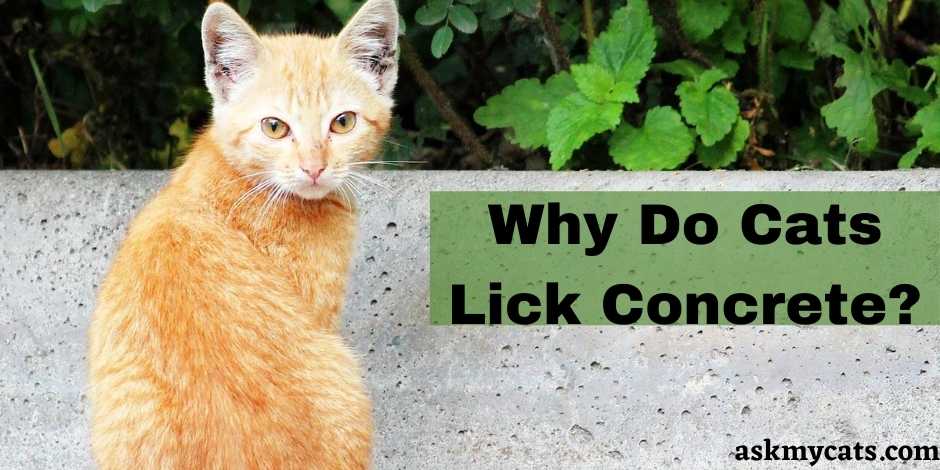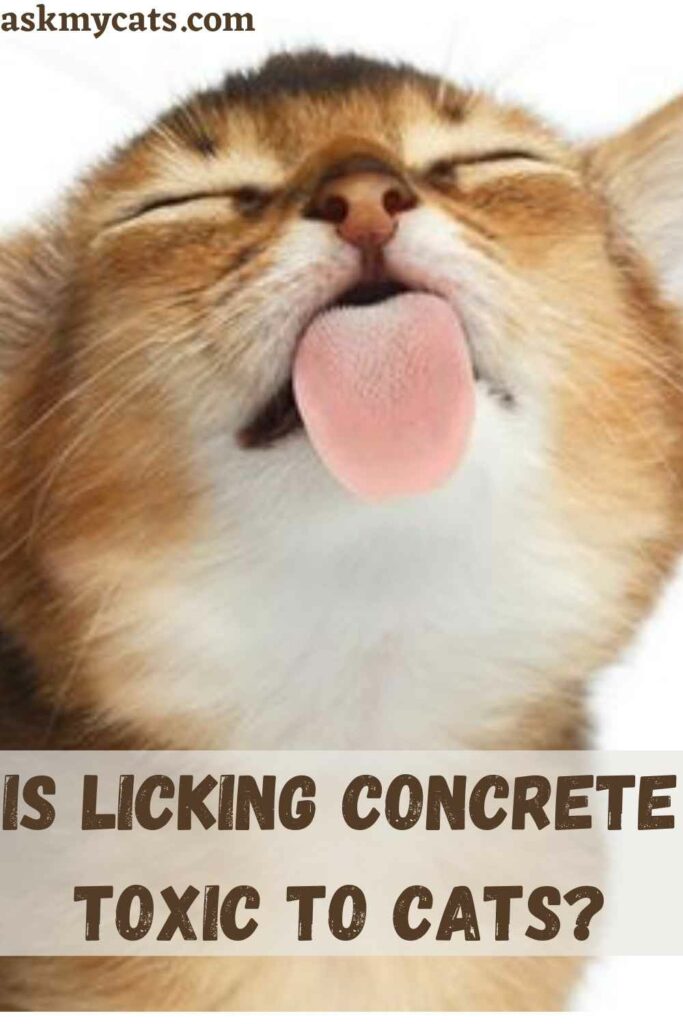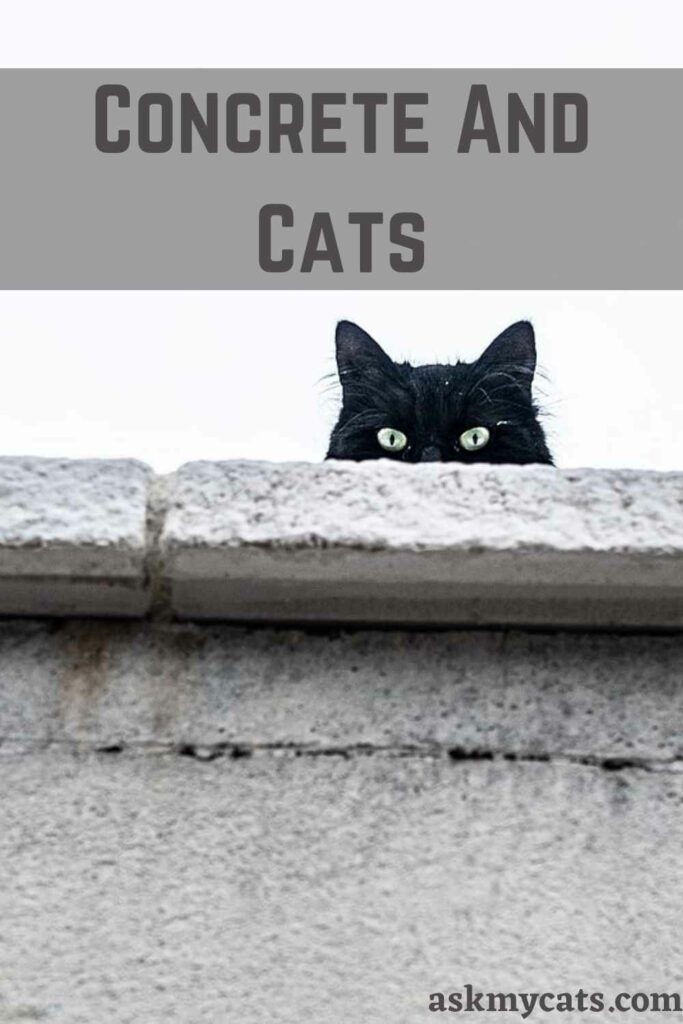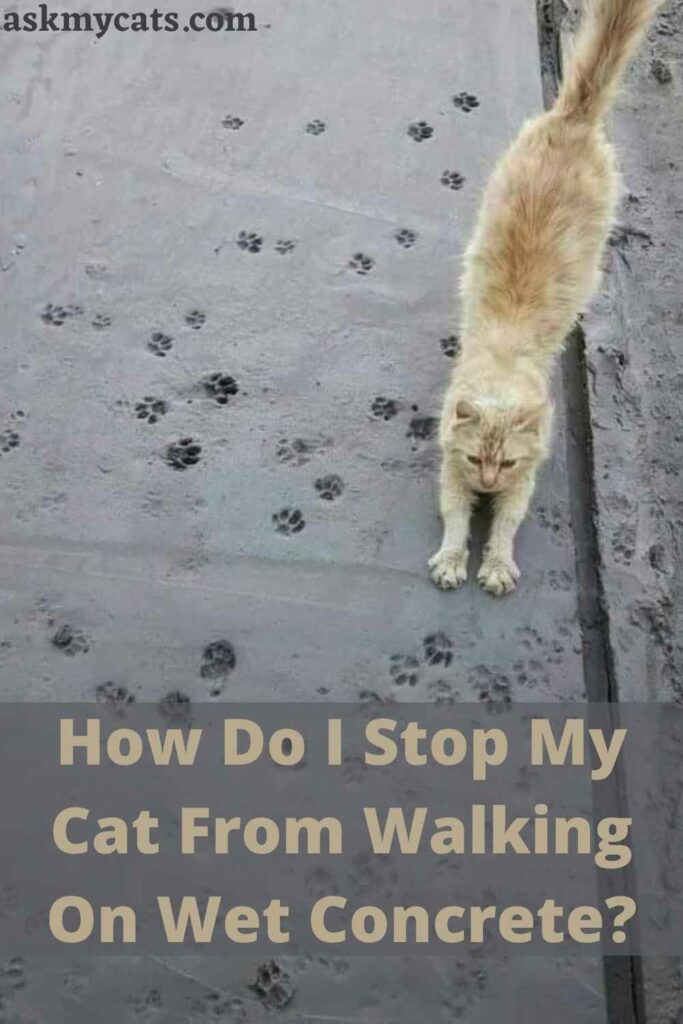Cats have a strange ability to pick up on strange behavior. Cats licking various home things or people is one of the strangest habits we’ve heard of.
Cats licking paper, walls, and cardboard have already been discussed, but now it’s time to discuss another uncommon material: concrete.
So, why do cats lick concrete?
Cats might lick concrete because of Pica caused by anemia, a lack of calcium, or another nutritional deficiency. In some circumstances, cats just lick the concrete because they enjoy the texture, temperature, or even flavor of it. While this behavior may appear to be harmless, there are some serious health risks to be aware of.
This article will talk about the reasons responsible for cats licking concrete and how you can stop them.

Give Your Cat the Perfect Day
Get the Free Ebook!

Is Licking Concrete Toxic To Cats?
Licking concrete is not toxic to cats unless they do not eat it. However, this could be a sign of an underlying medical condition.

While cats lick a number of things, and it’s usually harmless, licking concrete is a little different.
Pica caused by anemia or calcium deficits may not be linked to licking concrete.
Still, if your cat is licking the pavement of a driveway, they may be attracted to antifreeze.
Antifreeze is very toxic to cats, even a spoonfull of antifreeze could be lethal.
Neither of these is ideal circumstances for you or your feline companion.
While many of our cat’s licking antics can be attributed to him being funny, licking concrete isn’t one of them.
At least not until you and your veterinarian have done some research into why the behavior is occurring in the first place.
Concrete And Cats
Your cat may be licking concrete due to the following reasons: –

1. Feline Pica
Feline pica is a complex disorder in which cats are compelled to consume or lick non-food items for a variety of reasons, some of which are unclear.
However, not every occurrence of a cat licking something unexpected is caused by pica, and many cases of cat licking can be explained in other ways, which will be discussed further.
While there are some simple solutions to your cat licking concrete, there’s also the possibility that your cat is suffering from nutritional inadequacies that are creating pica symptoms.
Pica is generally associated with an underlying condition such as anemia or other dietary inadequacies, which can be puzzling.
To put it another way, a concrete licking cat could be suffering from pica as a result of anemia or another problem.
According to experts, there’s also a lot of overlap between the two, “licking concrete, eating cat litter, or soil” as a symptom of anemia.
While it’s not always clear why cats eat rocks or lick concrete, the most prevalent explanation is that cats feel obliged to compensate for their nutritional inadequacies in any way they can.
Our feline companions aren’t the only ones that do this; pica in people also entails eating similar objects such as concrete and soil.
Some veterinarians believe that licking concrete is linked to calcium insufficiency. Many cats with chronic kidney illness have too much or too little calcium, causing them to lick concrete, cement, and other hard surfaces.
This is precisely what makes this particular behavior and pica so perplexing! There are several causes. However, they all fall under the category of feline pica.
As a result, if you notice a sudden change in your cat’s behavior, such as licking concrete or anything else, you should visit your veterinarian.
Whether your cat is licking concrete as a result of pica or for one of the more benign reasons on our list, they can help you figure out what’s going on.
2. Texture and Temperature
Licking concrete or cement does not always indicate a medical condition, and some cats may just love the texture or temperature of concrete.
The texture and temperature response has been used to explain a variety of feline licking behaviors, including licking the windows and even the blinds, and it also applies here.
Cats don’t need a good cause to lick anything every now and then; they may simply enjoy the smooth or rough feel. Alternatively, they may enjoy the way concrete seems to retain extra heat or coldness, depending on the weather.
In any case, there’s something for every cat, as strange as it may sound because there’s so much difference in the texture and sorts of concrete and cement.
Despite this, after speaking with hundreds (if not thousands) of people about their cats’ strange habits, it appears that the majority of cats prefer to lick smooth surfaces.
Licking may be relaxing for cats, and while most excessive licking is directed at their own fur, it appears that some cats find licking another object to be relaxing as well.
3. Taste
Even if most of us wouldn’t think, “Wow, that looks wonderful!” when looking at a slab of concrete in the sun, our cats might.
But not without reason: it’s possible that our cats enjoy the taste of concrete.
Cats have been seen licking concrete patios and other outdoor dining areas, according to many people. What goes on in these kinds of places?
People consume food! They also spill food as they eat! There’s a good probability this will result in a variety of intriguing tastes and scents soaking into the concrete over time.
Your cat will happily slurp up various flavors, which range from smoky barbeque to savory sandwiches.
It won’t take much to reinforce your cat’s behavior if it’s particularly food motivated. If they’ve licked the concrete once after smelling something intriguing and been rewarded with a unique flavor, they might as well make concrete licking a daily habit.
However, there is some reason to be concerned about this rationale. Cats that lick concrete or cement roads may be looking for ethylene glycol, an antifreeze ingredient.
Antifreeze is extremely hazardous to cats, as well as almost all other living things. According to PetMD, even a single spoonful of cat food can be lethal.
Even worse, cats are drawn to ethylene glycol and will go out of their way to find it. While it’s unclear why cats appreciate the taste of antifreeze so much, it’s, unfortunately, a widespread problem.
Some say it’s because of the sweet taste, but cats can’t taste sweet, so it’s more probable that something else is driving our cats to seek out antifreeze.
Whatever the reason, if you find your cat licking the concrete near a driveway or anywhere else where cars are kept, you should be cautious.
4. Attention
Although this is unlikely to be the primary reason, you’d be amazed how many cats continue to engage in a certain behavior simply because they enjoy the attention they receive from their cat parent.
Licking concrete or cement is no exception, and if you give your cat attention every time they start to lick concrete by laughing, chatting to them, or patting them, your cat will rapidly learn that licking concrete gets them attention from their favorite person.
Of course, this isn’t the major reason for a cat to begin licking concrete, but it could explain why cats continue to do so—especially if there’s another source of positive reinforcement.
For example, a cat might lick the concrete because it tastes good under the table and then be rewarded when you pay attention to them after this stupid behavior.
Is Cement Dust Harmful To Cats?
Yes, cement dust is harmful to cats.
Cement dust litter is less dusty than regular clay litters, which is one of its advantages. However, If your cat already has respiratory problems, even a small amount of dust from cement litter can irritate him.
Cement dust irritates the airways, making it harder for your canine family member to breathe. Asthma, viral or bacterial infections, bronchitis, and even pneumonia might affect your cat.
These disorders may cause permanent damage to his lungs, resulting in chronic breathing problems.
Although cement dust may affect your cat, it is unlikely to be the sole cause of his breathing difficulties; rather, it exacerbates them.
Why Do Cats Walk On Wet Concrete?
Cats walk on wet concrete because they aren’t familiar with the concept of drying concrete.
The presence of animal paws spoils the look of freshly poured, smooth concrete.
Animals are unfamiliar with the concept of drying concrete and will accidentally wander across your new porch or walkway, leaving a permanent footprint.
Keeping animals away from fresh concrete, depending on where you live, can be difficult, especially since you’ll need to safeguard it for at least 24 hours.
If you want to secure the safety of the animals around you as well as the success of your construction operation, you must protect fresh concrete.
How Do I Stop My Cat From Walking On Wet Concrete?
You can stop your cat from walking on wet concrete by: –

Metal T-posts should be used to mark the location of your concrete pour. Drive them into the ground with a sledgehammer, one every five or six feet.
Pour the concrete and smooth it out yourself, or hire a concrete contractor to do it for you. Animals and children must be kept away from the concrete for at least 24 hours after it has been poured.
Apply a roll of chicken wire to the outside of the metal pegs and run it around the perimeter of your new concrete area.
This temporary fence will keep small animals away from your concrete until it’s ready for weight by cinching the wire to each metal stake with a couple of zip ties.
Depending on the types of animals in your area, leave your chicken wire fence up for 24 to 48 hours. Cats can walk on concrete for after 24 hours, but if you’re worried about dogs, coyotes, or deer, you should wait 48 hours for best safety.
So, if you are planning to renovate your house or driveway with concrete make sure to follow these steps.
Otherwise, your cute feline friend will become a huge hindrance to all your hard work.
Frequently Asked Questions
Why are cats attracted to concrete?
Cats are can be attracted to concrete due to several reasons like; your cat might be suffering from feline pica, your cat might like the texture and temperature, your cat might like the taste, and your cat might be wanting attention.
How do I stop my Cat from licking concrete?
Concrete or cement is usually seen outside the home. That means keeping your cat indoors is one of the simplest methods to keep them from licking concrete. Not only will this keep your cat safe from wild animals, automobiles, and accidents like licking up antifreeze, but it will also allow cat parents to identify changes in their cat’s health more immediately and take action. Because licking concrete may have medical implications, you’ll need to do more than merely block access. You’ll also want to make sure your cat is in good health, which will need a trip to the vet.
What are the substances in concrete and cement?
Concrete and cement floors lack the volatile chemicals found in plastics. Minerals and other substances that are edible or otherwise fascinating to cats are found in them. The concrete floor may discharge salts and minerals that the cat enjoys licking indoors or inside garages and sheds. External walks and patios may also include similar compounds, as well as algae, moss, or weed growths that a cat may find appealing.
Final Words
Like many other weird feline activities, Licking concrete turns out to be more sophisticated than it appears at first. While the behavior may appear to be comical, it could be a sign of feline pica, which is a symptom of nutritional insufficiency. It could also be your cat’s perplexing and perilous search for the ethylene glycol present in antifreeze.
Still, it’s not all awful, and a few cats could just appreciate the unique tastes, odors, and textures of concrete or cement.
However, it’s never a good idea to make assumptions, and if your cat suddenly starts licking concrete, it’s a good idea to consult your veterinarian.
If you have any unanswered questions, feel free to ask us in the comments section.
